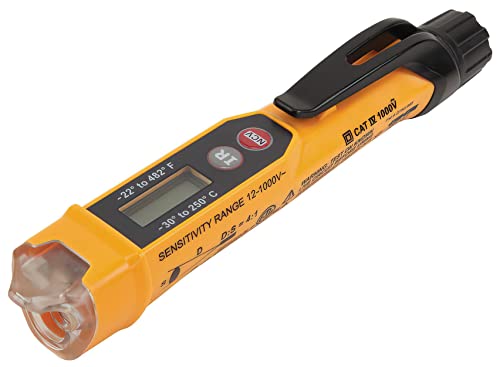If you feel confident in handling basic home electrical projects; replace a: wall switch, receptacle, light fixture, doorbell, or thermostat, you’ll need essential electrical tools, which include a safe method of detecting the presence of AC electricity. This is where the non-contact voltage testers come into play.
Top Pick: Klein NCVT-4 w/ IR Thermometer
- Voltage Tester designed specifically for HVAC applications
- Non-Contact Voltage Tester provides non-contact determination of AC voltage in cables, cords, circuit breakers, switches, outlets and wires, and AC voltage in security, entertainment, communications, environmental control, and irrigation systems
- Detects AC voltage from 12 to 1000V with visual and audible indicators
- 4:1 distance-to-spot ratio IR thermometer with user selectable Degrees Fahrenheit or Degrees Celsius from -22 to 482-Degree Fahrenheit (-30 to 250-Degree Celsius)
- Convenient laser pointer to target measurement area for temperature measurement
What to like:
- A voltage tester may not need to survive the demands of a rugged environment, but I still appreciate the use of thick plastic and heavy-duty construction.
- Having a screw cap for battery replacement may seem like a small detail, but compared to other brands and models that require squeezing and / or prying the battery cover off, the screw cap is a great feature.
- You’ll notice the absence of the flat extended tip. The high sensitivity of this detector can detect voltage on all receptacles, including tamper-resistant receptacles, from the surface of the receptacle and doesn’t require a tip or test probes to be inserted into a receptacle.
- The dual-range capabilities (12-1000VAC) can detect voltage on AC electric throughout the home: outlets, cords, switches, circuit breaker, power strip, thermostats, doorbells (before and after the transformer), humidistat, and security systems.
- There isn’t a flashlight on the NCVT-4, as the IR thermometer takes up that space, but the Blue LED standy lamp is bright enough to help light dim areas.
- The IR thermometer is very useful for investigating air leaks and lack of adequate insulation. Is the built-in IR thermometer a proper substitute for a thermal imaging camera? No! But you can conduct surface temperature variation tests to make a few home efficiency improvements.
In Summary: I have always preferred Fluke electrical tools, and I wasn’t initially convinced that I needed to keep a non-contact voltage detector, as my Fluke T+PRO Electrical Tester already has a lot of great features: detect live voltage even when the batteries are dead, detect AC/DC voltage, GFCI trip, and the backlit LED display gives exact voltage numbers.
As useful as the Fluke T+PRO is, the Klein NCVT-4 also has it’s key attributes, and I’m happy to keep both devices in my electrical tool kit.
Best Non-Contact Voltage Tester with LED Light: Milwaukee 2202-20
- Voltage Detector W/Led Light
- The product is easy to use and easy to handle
- The product is highly durable
Best Non-Contact Voltage Tester for Standard and Low Voltage: Klein Tools NCVT-2
- Voltage Tester automatically detects and indicates low voltage (12-48V AC) and standard voltage (48-1000V AC) allowing broad application
- Non-contact detection of standard voltage in cables, cords, circuit breakers, lighting fixtures, switches, outlets and wires
- Non-contact detection of low voltage in security, entertainment, communications, environmental control, and irrigation systems
- High intensity, bright green LED indicates the tester is operational and aids in illuminating the workspace
- Dual Range testing, select 12-1000V AC or 48-1000V AC
Best Non-Contact Voltage Tester with Flashlight: Extech DV25
- Pocket size non-contact voltage detector with two selectable ranges
- Non-contact detection of AC voltage in 2 ranges: 24 to 1000VAC and 100 to 1000VAC
- For use on 50/60Hz circuits
- Audible and visual voltage indication
Non-Contact Voltage Detector Buyer’s Huide
Easy to Use: Place the tip of a non-contact voltage tester near a device or wire where AC voltage is present. The tip will illuminate or change colors from it’s standby mode – and an audible alert may sound (varies per detector) – if voltage is detected.
Technical Details: To better understand how a non-contact voltage detector works, we’ll defer to the professionals at Fluke.
Understanding the Comparison Chart: Some of the information is self-explanatory, but the listed information may not be.
- Maximum Voltage Range: A typical single household circuit from the electrical panel ranges from 110-240 VAC. The difference between a 600 or 1000 VAC capable detector will be irrelevant for common homeowner use and only pertains to trained professionals working with higher voltage applications, e.g. outside power coming to the circuit panel.
- Low Voltage Range: To check thermostats and doorbells (transformer outlet), a low voltage or dual-range detector will be needed, as these components typically operate at 24VAC or lower.
- CAT III Rating: Refers to measurements on hard-wired equipment in fixed installations, distribution boards, and circuit breakers. Other examples are wiring, including: cables, bus bars, junction boxes, switches, and socket outlets in the fixed installation.
- CAT IV Rating: Rated test instruments are designed for testing on the primary supply source, which also includes 120V or 240V overhead or underground lines that power detached buildings or underground lines that power well pumps. The CAT IV rating covers the highest and most dangerous level of transient over-voltage.
DID YOU KNOW? Depending on the context, low-voltage and high-voltage are relative terms and vary by definition. Understand the type of electricity – mains electricity – delivered to your home.
| MANUFACTURER & MODEL | VOLTAGE RANGE | CAT RATING | AUDIBLE INDICATOR | WORK LIGHT | POWER SWITCH | BATTERY TYPE |
|---|---|---|---|---|---|---|
| EXTECH DV40 + IR THERMOMETER | 50 – 1000VAC | CAT III – 1000V | ✓ | 3 x LR44 | ||
| EXTECH 40130 | 100 – 600VAC | CAT III – 600V | ✓ | ✓ | 2 x AAA | |
| EXTECH DV20 | 100 – 600VAC | CAT III – 600V | ✓ | ✓ | 2 x AAA | |
| EXTECH DV24 | 50 – 1000VAC | CAT IV – 1000V | ✓ | ✓ | 2 x AAA | |
| EXTECH DV25 DUAL-RANGE | 24 – 1000VAC | CAT IV – 1000V | ✓ | ✓ | ✓ | 2 x AAA |
| EXTECH DV26 | 100 – 1000VAC | CAT III – 1000VAC, CAT IV – 600VAC | ✓ | ✓ | ✓ | 2 x AAA |
| EXTECH DV30 ADJUSTABLE SENSITIVITY | 12 – 600VAC | CAT III – 600V | ✓ | 4 x LR44 | ||
| EXTECH DVA30 + CURRENT | 12 – 600VAC, 200mA to 1000A | CAT III – 600V | ✓ | 4 x LR44 | ||
| FLIR VP50 | 24 – 1000VAC | CAT IV – 1000V | ✓ | ✓ | 2 x AAA | |
| FLUKE 2AC VOLTALERT™ | 90 – 1000VAC | CAT IV – 1000V | 2 x AAA | |||
| FLUKE 1AC-II A1 VOLTALERT™ | 90 – 1000VAC | CAT IV – 1000V | ✓ | ✓ | 2 x AAA | |
| FLUKE 1AC II A2 VOLTALERT™ | 90 – 1000VAC | CAT IV – 1000V | ✓ | ✓ | 2 x AAA | |
| FLUKE 1LAC II A VOLTALERTT™ | 20 – 90VAC | CAT IV – 1000V | ✓ | ✓ | 2 x AAA | |
| FLUKE LVD2 VOLT LIGHT | 90 – 600VAC | CAT IV – 600V | ✓ | ✓ | 1 x AAA | |
| GREENLEE GT-12A | 50 – 1000VAC | CAT IV – 1000V | ✓ | ✓ | 2 x AAA | |
| GREENLEE TR-12A | 50 – 1000VAC | CAT IV – 1000V | ✓ | ✓ | 2 x AAA | |
| GREENLEE GT-16 ADJUSTABLE | 5 – 1000VAC | CAT IV – 1000V | ✓ | 1 x AAA | ||
| KLEIN NCVT-1 | 50 – 1000VAC | CAT IV – 1000V | ✓ | ✓ | ✓ | 2 x AAA |
| KLEIN NCVT-2 | 12 – 1000VAC | CAT IV – 1000V | ✓ | ✓ | ✓ | 2 x AAA |
| KLEIN NCVT-3 W/ LED BAR GRAPH | 12 – 1000VAC | CAT IV – 1000V | ✓ | ✓ | ✓ | 2 x AAA |
| KLEIN NCVT-4 W/ IR THERMOMETER | 12 – 1000VAC | CAT IV – 1000V | ✓ | ✓ | 2 x AAA | |
| MILWAUKEE 2202-20 | 50 – 1000VAC | CAT IV – 1000V | ✓ | ✓ | ✓ | 2 x AAA |
| MILWAUKEE 2200-20 | 50 – 1000VAC | CAT IV – 1000V | ✓ | ✓ | 2 x AAA | |
| MILWAUKEE 2203-20 DUAL-RANGE | 10 – 49VAC, 50 – 1000VAC | CAT IV – 1000V | ✓ | ✓ | 2 x AAA | |
| SANTRONICS ULTIMATE AC | 50 – 1000VAC | CAT IV – 1000V | ✓ | 2 x AAA | ||
| SANTRONICS AC | 50 – 1000VAC | CAT IV – 1000V | 2 x AAA | |||
| SANTRONICS LOW AC | 24 – 90VAC | CAT IV – 1000V | 2 x AAA | |||
| SANTRONICS DC | 6 – 50VDC | N/A | ✓ | |||
| SPERRY VD6504 | 50 – 1000VAC | CAT III – 1000V, CAT IV – 600V | ✓ | ✓ | 1 x AAA | |
| SPERRY VD6505 – ADJUSTABLE | 12 – 1000VAC | CAT III – 1000V, CAT IV – 600V | ✓ | ✓ | 1 x AAA |
Empirical Data: Beyond explaining and comparing the common specs between voltage detectors, we also selected and purchased several of the non-contact voltage detectors to include firsthand observations, and we chose a top pick.
- Each brand and model tested had different audible sound levels. I would like to see manufacturers list the db level in their specs as it can be an important factor.
- Static electricity was detected by all testers, however, the manufacturers took this false reading into consideration. Non-contact voltage detectors will only cause flashes of light and possibly single chirps – instead of a steady light and steady audible alarms for true voltage.
- A response from Santronic said, “Our voltage testers are manufactured, printed, and packaged in the US.”












